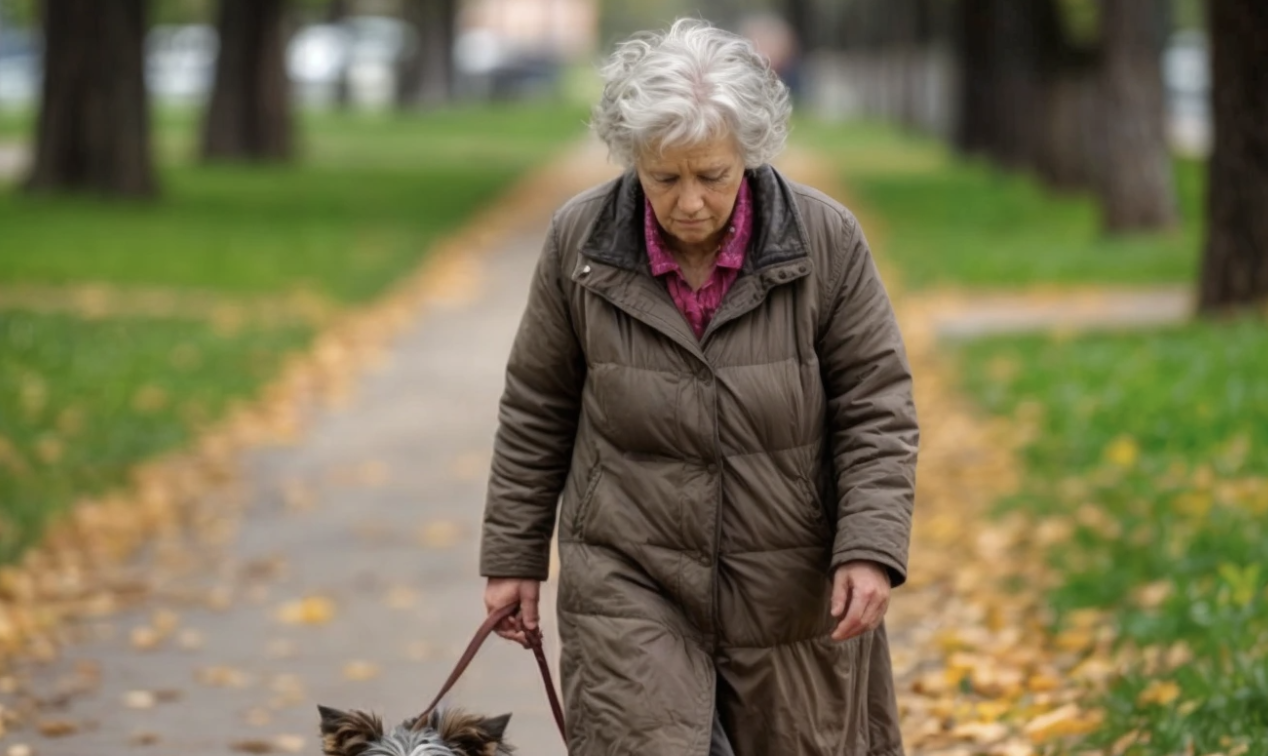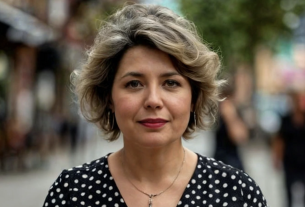The old woman from apartment 23 had long become a legend throughout the entire building. Not in a good way, of course — rather, she belonged to those dreadful everyday nightmares whispered about on the stair landings, sighed over near the mailboxes, and grumbled about while drinking tea with neighbors. Most people didn’t even know her name, and her patronymic even less so. To be honest, no one really cared to find out. For everyone, she was simply “that old hag from 23,” the object of collective irritation, a constant headache, a source of chaos and unrest.
The neighbors’ concerns boiled down to two questions: “When will this mess finally end?” and “How much longer can we endure this?!” These questions were so frequent they almost became a mantra. Anyone who dared to go up to apartment 23’s door already knew what to expect: the creak of the door, a long silence, and then a quiet, hoarse voice:
— “Huh? What?”
A small, stooped woman peered out from behind the door. Her gray hair stuck out in tufts, thick-lensed glasses almost pressed against the bridge of her nose, and a gray strip of adhesive tape wrapped around the frames gave her a somewhat comical yet pitiful appearance. On her feet were shabby boots, as if taken from a garbage dump, and nearby was a tiny little dog barking as loudly as if trying to defend an entire empire rather than a neglected one-room apartment.
Sometimes the old woman would open the door, sometimes she pretended no one was there. Sometimes she would just look carefully at the disgruntled neighbor, tilting her head slightly as if trying to understand what was being said. And if someone actually dared to raise their voice — for example, to complain about the endless crackling from the TV that blasted from early morning till midnight — she would nod and say something like:
— “Soon, soon…”
And indeed, for a while it would get quiet. But that was only a temporary respite. Within a day or two, everything would start again: the howling of the TV, the nasty red cockroaches crawling out from the cracks, and the musty stench that crept through the floors like death itself, bypassing every apartment.
The neighbors tried to fight as best they could: they sprayed insects with aerosols, set traps, bought special gels. But these creatures turned out smarter than people — they hid in the old woman’s apartment, survived the epidemics and came back again as if returning home. And the smell was impossible to get rid of. It was everywhere: in the elevator, on the stairwell, even in the entrance hall it was clear — somewhere close by was rot, mold, and decay.
No one remembered exactly when Nina Fyodorovna moved into the building. Maybe thirty years ago, maybe more. She lived quietly, unnoticed, until she became the cause of constant stress for the whole building. Even the local police officer came by, warned, threatened fines. The old woman listened, nodded, smiled with her childish smile, but nothing changed.
And yet she had a name — Nina Fyodorovna. She was almost eighty-five years old. After a severe cold last year, she had practically become deaf. She tried to get on the waiting list for a hearing aid, but the queue moved slowly, or maybe she was simply forgotten. She had no money for a paid device. Her pension was meager. She had to pay for utilities, buy medicine, food for herself and for Zhuja — a tiny dog, the only living being left with Nina Fyodorovna.
Yes, it was Zhuja who saved her from complete loneliness. It happened fifteen years ago when her husband died. They had lived together all their lives, soul to soul. They had no children. No relatives either. Her friends passed away one by one, and Nina was left all alone. One day, returning from the store in a sudden autumn rain, she noticed a puppy near the garbage bins. Dirty, trembling, it pressed against the wall as if begging for help. Nina wanted to pass by:
— “I can’t take you… I’ll be dead soon myself.”
But the puppy seemed to decide otherwise. It followed her. That’s how a new chapter in the lonely woman’s life began. The puppy became her friend, support, meaning. Almost six years have passed since that day. The apartment gradually turned into an old witch’s lair: dirt, smells, dust. But Nina didn’t notice. Or didn’t want to notice. The walls were thick, and she didn’t care about the neighbors.
Meanwhile, changes began to happen in the building. The neighbor from apartment 27, who lived one floor above, smiled happily when she heard their mortgage was approved. Finally, they could move away from the noise, smells, and cockroaches. They decided to rent out their apartment — let the youth live there, and the money would go toward the loan. The old woman, they said, wouldn’t last long — then they could raise the price.
And one day Masha moved into the building. Newly divorced, with a child, without her own home. She happily signed the lease agreement, not noticing any smell or signs of cockroaches. Only in the evening, when her son had fallen asleep, did she turn on the kitchen light… and saw two disgusting creatures running across the countertop.
That was the first warning. The first sign that now her life would also become part of this strange story.
“Ugh, disgusting!” Masha exclaimed, stepping back from the kitchen table and shuddering at the sight of two cockroaches running across the wooden countertop as if oblivious to her outrage. “Are they really still around somewhere?”
Memories flooded in suddenly: childhood in an old house that was due for demolition last century. Back then, cockroaches were almost family members — annoying, unwanted, but still familiar. Then the family moved to a new two-room apartment, and the insects were forgotten completely. Her parents still lived there. After the divorce, they offered for her to return, but Masha didn’t want to. Her job was here, Artem’s kindergarten was here, and most importantly — this city offered more opportunities than her parents’ small town.
“Now it’s clear why it’s so cheap,” she snorted, looking around the spacious kitchen that was supposed to be a place of comfort and warmth but looked like a battlefield after meeting an ancient enemy. “Tomorrow I’ll do a thorough cleaning and treat the place for those… creatures. After a good sleep, of course. Tomorrow’s a day off — plenty of time.”
But the morning didn’t go as planned. Around six a.m., Masha woke up to loud crackling and a male voice pouring out from the television. At first, she thought someone was walking outside, but then realized the noise was coming from inside the building. And apparently, from the floor below.
“What madness is this?!” she hissed through clenched teeth, pulling the blanket over her head. But sleep was irretrievably lost.
After breakfast, mother and son went to the store. They needed to buy everything necessary: brushes, cleaning agents, insect aerosols. On the way, they stopped at the playground — Artem loved playing with other children. There Masha met a neighbor living on the third floor. The woman immediately seemed a little strange — her eyes looked tired, and there was even a hint of anxiety in them.
“We only moved in yesterday on the fourth floor,” Masha explained, watching her son happily play with a girl. “The apartment is nice, bright, but I already saw a cockroach in the kitchen yesterday. I thought those didn’t exist anymore. But it’s okay, I’ll clean today, there are lots of modern safe products. We’ll set things right!”
“For a little while,” the woman shook her head sympathetically. She began telling her about “the old woman from 23,” whose problems had become the building’s legend. About the noise, smell, cockroaches, the neighbors’ helplessness, and the harshness of their words. Masha listened, shocked. She felt sorry for the old lady. Why doesn’t anyone help? She probably has no one?
“Maybe she has relatives but they don’t want to bother,” Masha guessed. “Or maybe they’re just waiting for her… to go, to take the apartment.”
The neighbor nodded without denying it.
When they returned from the store, a small stooped woman stood by the entrance. Next to her sat a patient white dog. Masha immediately recognized her — it was her. The old woman was trying to fit the key into the intercom lock, but her hands trembled. Artem shouted joyfully:
“Dog!”
He ran to the animal, reaching out his hand. To Masha’s surprise, the dog didn’t bark but just wagged its tail.
Masha carefully took her shopping bag and helped the woman by the arm. They were silent in the elevator. On the third floor, Nina Fyodorovna fiddled with the keys for a long time but eventually opened the door. Masha went inside to put down the bag and immediately smelled the musty stench. Inside reigned disorder and neglect, but the old woman’s look — full of gratitude and trust — struck Masha deeply.
“How lonely she lives,” Masha thought on the way home. “She lived her whole life, and now — alone, in dirt and noise, surrounded by strangers’ unkind words.”
She decided to help. Simply because she could. That evening, while Artem slept, she called Lev — her old classmate who now did volunteer work. He promised to help arrange the hearing aid for Nina Fyodorovna.
And so began a new era in the lives of the three — Masha, Artem, and Zhuja. They regularly visited the old woman, bought groceries, took walks together, sometimes just sat and watched TV. Nina Fyodorovna rejoiced at every visit, especially that Zhuja now had a friend — a boy to run with, play ball, be free and loved.
The neighbors began to notice changes. The cockroaches disappeared. The smell became less noticeable. The TV was no longer on all day and night. And then they saw how often the new neighbor visited the old woman. Rumors spread again.
“So that’s why she was interested in relatives,” the neighbor from the third floor concluded. “Decided to grab the apartment.”
Her husband just snorted:
“That’s a smart scheme. Why didn’t we think of it ourselves?”
“Would you take care of the old woman?” the woman asked sarcastically.
“Well, you weren’t exactly rushing either.”
They continued bickering as usual. But Masha didn’t care. For her, it was more important that Nina Fyodorovna felt at least a little better. Something warm and real was happening between these three people and one dog. It was more than just help. It was humanity.
Almost a year passed. One day, Masha and Artem came to Nina Fyodorovna’s as usual. But the door didn’t open. Zhuja whimpered behind it. Masha’s heart clenched.
She called an ambulance, then Lev. He arrived quickly, even before the medics. When the doctors were about to leave saying nothing could be done without the police, Lev confidently said:
“Five minutes.”
Three minutes later, he had already opened the door — through the balcony. Zhuja rushed out and ran to Artem, wagging her tail happily. Lev looked briefly at Masha:
“Go home. Take a walk. I’ll handle everything.”
Masha understood. Nina Fyodorovna had passed away. Without pain, without noise, without extra words. Just as she probably wanted.
At home, Artem played with Zhuja as if nothing had happened, and suddenly asked:
“Why don’t we take Zhuja back to Grandma Nina?”
Masha sat down beside him, stroked his head:
“Because now Zhuja will live with us. And Grandma Nina won’t be lonely anymore. She’s gone. To a place where she is well.”
Lev came late that evening. He promised to take care of the funeral arrangements. Nina Fyodorovna had trusted him long ago, and he kept his word.
Meanwhile, the neighbors watched the apartment, waiting for the heirs. Waiting to see who would get the cherished space. And then she appeared. The heir was Masha. It turned out the old woman had prepared documents in advance, leaving everything to the caring neighbor.
That night, while cleaning the apartment, Masha heard neighbors arguing again behind the walls. They blamed each other for not thinking to “take care” of the old woman in time. Masha smiled. Not out of anger, but with a sad gratitude to life, which taught her to see people — not enemies, not problems, not inconveniences — just people who need help.
She made a decision: she would sell the apartment. She was happy because Lev, Artem, and Zhuja were nearby. And now they were a real family.



